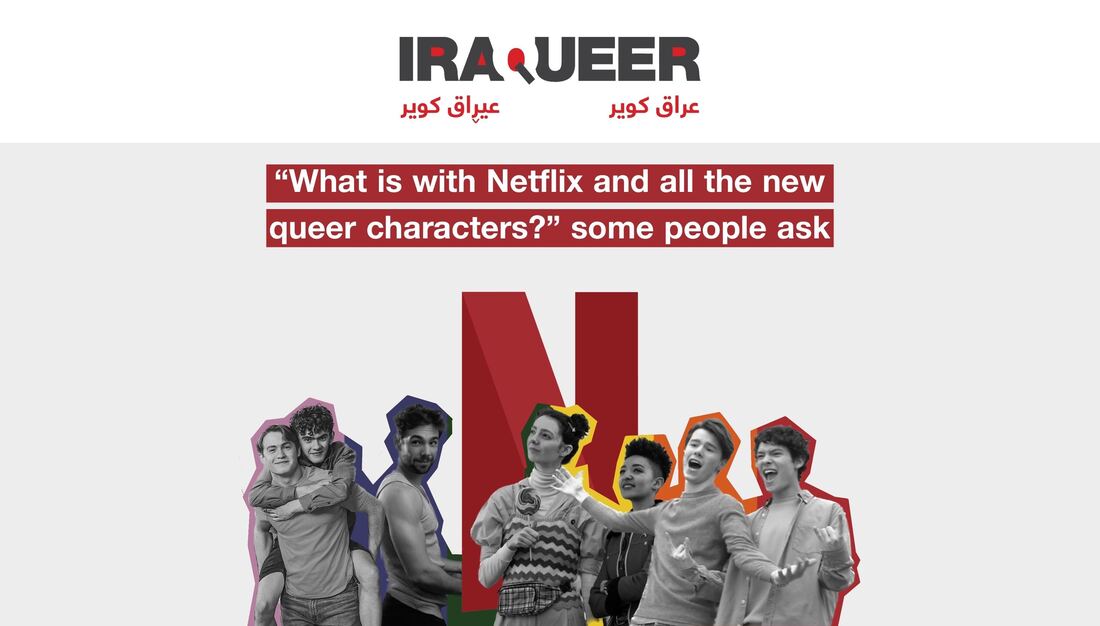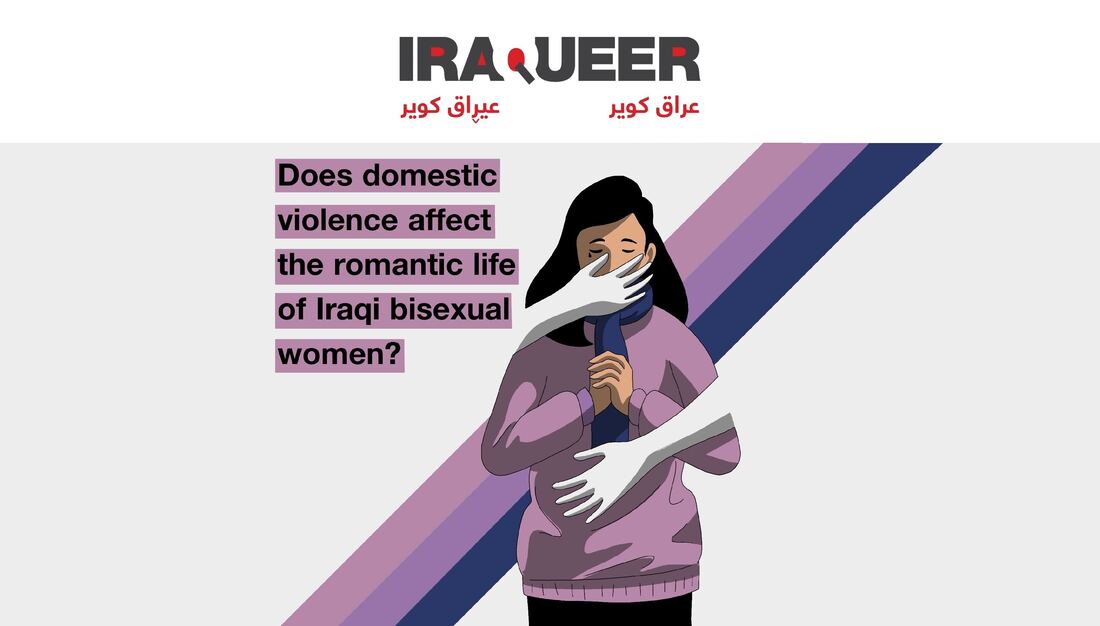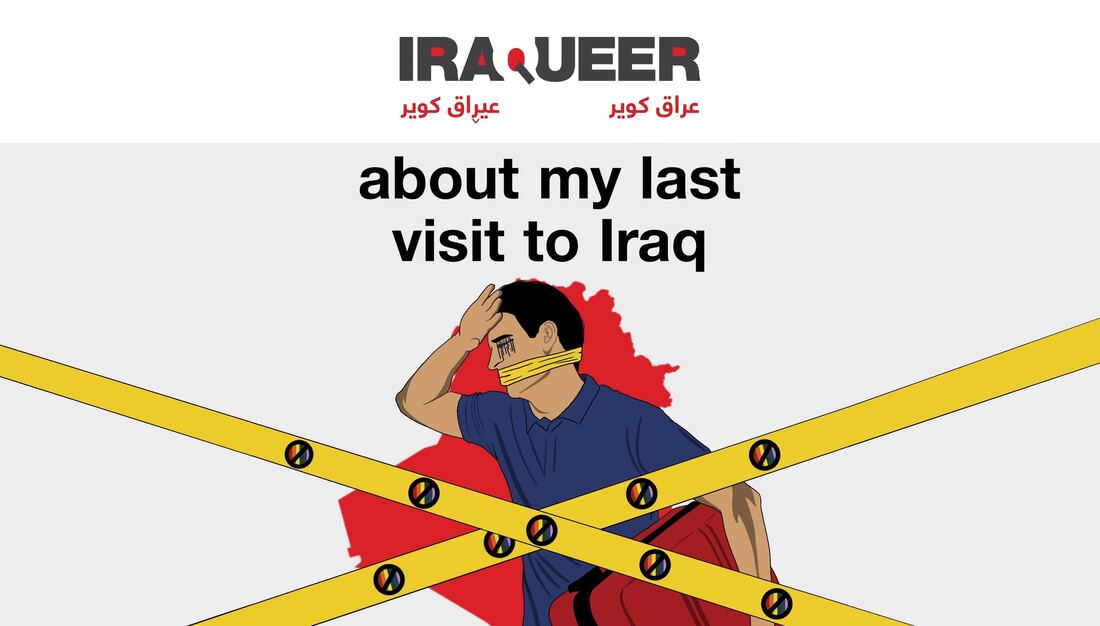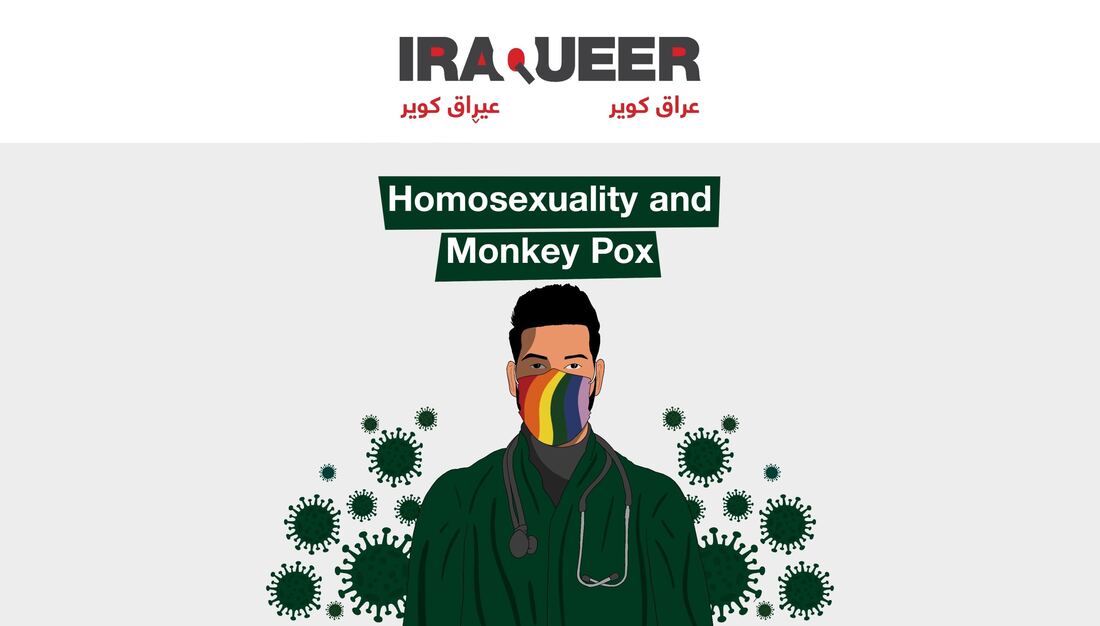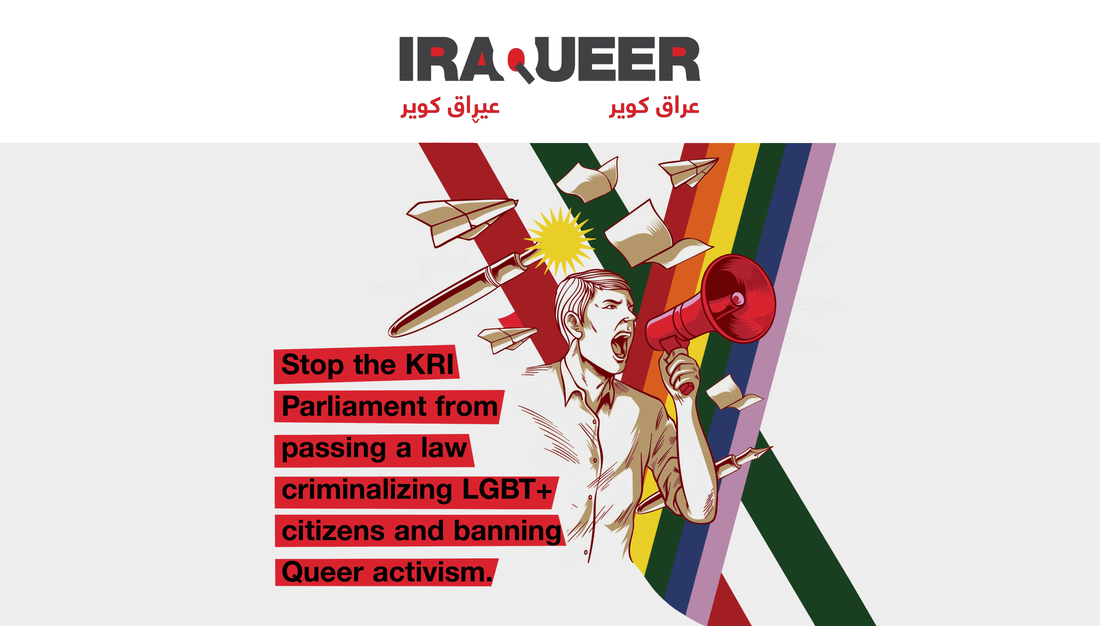|
Non-binary people suffer from constant persecution in Iraq, where society does not know their gender identity at all, and they see them only as people "similar to women" or "tomboys", as Iraqi society calls them, and because of this, many non-binary individuals are trying to hide their identity and gender stereotypes of men and women, especially with the recent law
But even before the law, the situation was not good for non-binary individuals, many of them were killed, kidnapped, tortured and raped by militias in Iraq, which sees them only as homosexuals, even if these people are attracted to the opposite sex, says Alex, who is not a binary born as a male using pronouns (he/she/they): It is very difficult to live in a society that puts for everything a certain template and a certain image of everything that dehumanizes itself in dealing with people, usually dealing with me in a sexual way, most often male, or in a demeaning way, because I am not like girls and I am not like young men in my form and manner of expression, this marginalization extends from ' it's a shame to see LGBT people doing the same thing to non-binary people' A lot of people are unaware, even from members of the LGBT community, that biological sex has nothing to do with gender, and the Arabic expression is a purely hard language in its rules in the pronouns of the speaker and the one that you speak to him , I usually ask those close to me to use the plural or feminine beside using my name (Alex) The difficulty also extends even to getting clothes or things that enable Alex to express herself in what she says : I find it very difficult to find clothes or items that describe my personality as non-binary or that help me express my queer identity And the sexual harassment and harassment that Alex faces does not end because of her appearance and non-standard identity, she also says :- A close friend of mine at the University told me that those who were with me at the stage describe me as working in prostitution because of my appearance, too, I was harassed by people from other stages or trying to look at me in an understated or stupid way by colleagues or those I met Alex explained to us a small part of her daily suffering, which gives a picture of what non-binary individuals are exposed to inside Iraq, and we hope that the situation will become better for them and that they can live with all love and peace
0 Comments
“It is foolish to feel proud of qualities that you do not possess yourself, but as for the natural things that you possess, it is perfectly acceptable to feel proud of that.”
The Enchiridion Book, Chapter 6, Paragraph 53. This is a phrase that was mentioned in the book (The Enchiridion) by the Stoic philosopher, Epictetus, and as is clear from the text of the quote or phrase, Epictetus tells us more than 2000 years ago, that you should feel proud because of your possession of natural, unique things in yourself, and here we mean, of course, homosexuality. Nationality: Being gay is a very natural thing, that is, the nature of your gift is a difference, not as a genetic mutation or a biological error, but rather as a distinctive gift, and as we know, this world is full of all kinds of tendencies and differences, whether sexual, cultural, political, social, or civilizational. However, we must be proud of the things we possess, we must be proud of homosexuality as a natural thing and as it stems from the same source from which we came and to which we will return, nature. You may ask me, most people do not like homosexuality and view it as a wrong genetic mutation, a biological error, or even just brainwashing imported by Western cultures, so how do you explain that to them? I would like to point out that homosexuality has existed since time immemorial, and as Marcus Aurelius says in his book Meditations: “Nothing happens to a human being outside the scope of the human being’s natural experience. The same applies to the bull. Nothing in his experiences is strange to the natural nature of the bull. If everything tells what is usual and natural for him, then what do you complain about? As long as nature has not brought you anything beyond your tolerance.” . Meditations of Marcus Aurelius, chapter 8, paragraph 46. As is clear from this quote, nature does not bring anything strange from outside this world. Homosexuality exists in humans as it exists in animals, and homosexuality is deeply rooted in history since humans began forming villages and small communities, so where is the real abnormality of those who speak? About him?! How do you describe his natural inclinations as abnormal just because the vast majority of people have inclinations toward another gender?! What logic is this? Secondly, even if we assume, for the sake of argument, that my sexual orientation is unnatural, what will we do with gays or members of the LGBT community - will we kill them? Because they are a minority and distorted from a biological point of view, or should we contain them and accept them as they are because, first and foremost, they are human beings? In conclusion, I would like you to remember the words of the philosophers Epictetus and Marcus Aurelius, about natural inclinations and that you should feel proud to have sexual inclinations that are different from the vast majority of people. Accept your difference boy. At first, you cannot face any punishment without evidence, and therefore you can reduce the risk of the law on your lives, by erasing your traces and not leaving evidence on you, and in Iraq, where it is difficult for LGBT people to express themselves, so they resort to the virtual world, which makes digital security one of the most important topics that we advise LGBTI:
- Never give your phone to security agents, and if you have to, break it or throw it out of the car window or others, it is important not to give them evidence، - Do not talk about anything related to the LGBT community on social networking sites on your personal accounts, as well as do not interfere in discussions about the topic with other people in the comments section, so that someone does not photograph it and consider it as evidence that can be used against you in the future. - Avoid sharing your location and number with anyone, and even delivery requests, we advise you to order from another phone at home,or like as asking your brother to do the order. - Do not use dating apps as much as possible, and do not go out on dates with people you do not know or take your friends strong personal knowledge. - Remove all photos, files and applications on your phones that may be used as evidence against you, or transfer them to a memory and keep them in a safe place that only you know. - Do not post photos or videos of you as much as possible, and if you post, try not to make your queer identity clear in them - Do not send your photos to people with whom you do not have a close relationship, even if those photos are not queer. - Turn your accounts into private, and cancel every fake account or person you don't know well. - Do not leave your mobile without a passcode, in addition, put them near you always, so that no one can search them behind your back. - Do not click on any link or image sent to you by someone you do not know. Because it may be mined and at the time you click on it, the sender gets your information, location, name, type of phone and many other sensitive information. - Avoid using public Wi-Fi networks, or those that do not have a passcode. - Use secondary authentication for all your accounts, for greater protection - Change passcodes for your accounts, choose new and complex codes. - Use vpn applications when you use the internet - Updating the applications and the system periodically and continuously, to fill all existing gaps - Delete apps that you don't use but are still in your phones. - Use more secure messaging applications, such as the signal application to communicate with your friends, instead of WhatsApp or Messenger. Because these applications provide secure encrypted conversations that no one can hack - Delete messages and conversations between you and your friends periodically and continuously, so that there is no evidence against you in the event that something unloved happened to you. - Communicate with local organizations or those located in the countries of the region that specialize in providing digital support in case of any emergency, but before that you must be sure that this organization is safe for members of the LGBT community. - Not to sell your mobile or laptop , but to keep them with you, get rid of them, so that no one can access their deleted content, which contains your private and sensitive information - Make an hour or half an hour of each day as a special time to read more about the topic of digital security and its many details. If you apply the above remarks, then you have been able to reduce the risk of the law on your lives to more than ٩٠% of its real danger only digitally, and you have reduced the chance of anyone obtaining evidence of you that can be used against you, as we hope you are taking these steps as a lifestyle in this difficult situation to maintain your security and safety. The amendment of law 8 of the year 1988 is a flagrant and serious violation of human rights in Iraq and giving legitimacy to the systematic killings led by armed groups
IraQueer’s Statement on the First Amendment to the Anti-Prostitution Law At a time when countries are trying their best to provide the best services to their citizens, including the enactment of laws that guarantee freedom and equality for all, without discrimination due to race, gender, language or religion, we are surprised today by the Iraqi Council of Representatives voting on the proposal of the First Amendment law to the Anti-Prostitution Law in violation of the Iraqi constitution, which states: First B- It is prohibited to enact a law that contradicts with the principles of democracy C- It is prohibited to pass a law that contradicts with the fundamental rights and freedoms contained in this Constitution Article 14 Iraq citizens are equal in the law without discrimination on the bases such sex, race, nationality, origin, color, religion, sect, belief, opinion, economic or social status. To legislate of such a law gives legitimacy to armed groups in order to continue targeting homosexuals, but this time under the authority of the law, and also a clear justification for their work over the years, the article of the campaigns of murder and torture The LGBT+ community in Iraq is being subjected to a genocide that began in 2009 when armed groups killed tens of LGBT+ individuals of in the streets of Baghdad and other cities in front of the attention of the government without any serious action by the government to protect them, followed by the killing and torture campaigns carried out by ISIS in Mosul and the areas it controlled, and the killing, torture and brutality by outlaw groups continues. IraQueer, in cooperation with Human Rights Watch, documented cases of attempted murder, killings, sexual violence, including rape, and online harassment against members of the LGBT+ community by Iraqi armed groups in addition to the cases of murder and torture of LGBT+ people by their parents or clans that were followed by media campaigns that linked many of the disasters happening in the world to homosexuality without having any serious government move to stop those shady campaigns, and the last of those campaigns has been the unfair, dangerous, and violating human rights in Iraq the Syrian law issued by the Iraqi Council of Representatives today At the same time, the Iraqi government has not taken any significant steps to protect LGBT+ people or provide legal guarantees against discrimination. As a result, LGBT+ people in Iraq face significant challenges in accessing healthcare, employment and housing, as they are often disadvantaged or marginalized. We, in IraQueer, affirm that we are continuing our work and no force will dissuade us from demanding our rights and equality with the rest of the members of the Iraqi society and respect us as human beings who have the right to live in freedom and dignity. We also call on the House of Representatives to withdraw this decision and pay attention to the issues that are important that concern the citizens of Iraq, which have been stalled for years in the House of Representatives We also call on the international community and international governments to support Iraq in its issues and stand firmly against the legislation of such a law and work with us in order to use all the necessary ways to stop this law, at the same time, we remind that Iraq is part of the international community and issuing such type of laws is a clear violation of the international agreements signed by Iraq, including:
As a blogger, Ahmed’s story was very inspiring, but at the same time I felt great pain when I listened to Ahmed telling it to me and when I was writing it, as it summarizes the amount of suffering that trans people in Iraq go through. Ahmed is an eighteen-year-old Iraqi trans man, and despite his young age, he has been through many difficult experiences and traumas. What makes me happy is that Ahmed is still among us and is still trying his best to emerge from this war that his family and the Iraqi society started against him.
Ahmed discovered his sexuality and desire to become a male at the age of thirteen so he began to change his appearance and style, but that was also the point where he began to suffer from psychological problems, which is why he decided to seek help from a psychiatrist. The psychiatrist explained to Ahmed that feeling that he is a male in a female body does not mean he suffers from any mental problems or any disease, but rather that he was merely born into a body in which he does not feel comfortable and does not express what is inside him. The positive thing was the psychiatrist’s positive response to Ahmed’s words, which made Ahmed explain his situation very clearly. After meeting with the psychiatrist, Ahmed’s mother attacked him and argued with him which pushed him to take all the depression pills he was using to combat his suicidal and negative thoughts at once and attempt suicide. Even after that incident, his mother did not stop attacking Ahmed despite his bad health condition. Ahmed’s father, on the other side, was not any better than the mother. Ahmed was abused and harassed by his father constantly. Ahmed had reached a difficult stage of depression, where he no longer felt any emotions, which is why he used to smoke and turn off the cigarettes on his skin. In an attempt to fix him, his parents took him to some witches where he got accused of being possessed by jinn and that he had to try to become closer to god and wear an abaya . His parents continued taking him to doctors here and there to find medication to fix him. Ahmed was forbidden from using his phone thus he lost his connection with the world. He was given his medication by his parents and forced to swallow them in front of them without knowing what type of medication he was given. After a while, Ahmed discovered that the medication he was forced to take was schizophrenia medication. Ahmed's life went from bad to worse when his parents got divorced. Ahmed felt very uncomfortable in his father's house because his father was constantly harassing him and his mother did not want to host him in her house. Even after the divorce, his parents were determined to get rid of Ahmed by forcing him to get married. When Ahmed reached the point of despair again, he attempted suicide for the second time by throwing himself from his parents' apartment after a huge fight between him and his parents. After falling to the ground, Ahmed suffered from injuries, but he got up and started walking away from his parents, who previously tried to lock him inside the apartment. Ahmed's mother is a woman of influence and power in the Kurdish regions of Iraq, and his father is of power and influence in the Arab regions of Iraq, and for this reason Ahmed had to be very careful about where to hide. Ahmed's presence in Iraq in general was a severe threat to his life but he had no way to leave the country. After all the fear and suffering, Ahmed decided never to return to his parents so he began searching for a job here and there to afford the costs of living. Ahmed worked in several places, and whenever work posed a threat to his life due to his identity, he would leave and go somewhere else in search of another work opportunity. Ahmed started working in a new place when he noticed the presence of a man at his workplace coming from time to time. The man once broke his silence and offered to adopt Ahmed as he was under the legal age. The man explained to Ahmed that he was not married and had no children and would like to adopt Ahmed and introduce him to his family. The first period was a good stage between the two, as Ahmed met the man's family and started living in his house. This good phase did not last long, as the man began harassing Ahmed until the matter between them ended up in a big fight and violence which led to Ahmed leaving the house. In short, Ahmed's entire life is made up of anxiety, suffering, and fear. Ahmed was never able to feel safe sleeping at night, walk safely in the street, or change his clothes in complete comfort without worrying about being harassed. His work was never stable and he was forced to move from one job to another due to transphobia. Ahmed was always forced to work in small, close-minded places and areas because working there did not require any documents. Ahmed only had his old documents before his transition as the Iraqi government does not give trans people any documents. Hehe tried to apply for new documents with the help of a lawyer, but no good results came out of that. even though Ahmed has not yet entered his twenties, he has lived through a tremendous amount of misery and fear. A person like Ahmed, with his courage and patience, cannot and will not be beaten by the Iraqi society. Many people complain that Netflix has gone too far by adding many queer characters to its shows in the past few years. Some people - who are homophobic but consider themselves not to be so, complain that they are no longer able to watch a show with their families or suggest a show to their friends without worrying about being judged for watching a show that includes queer characters. Some of these people might not be questioned about their sexuality but they would still feel the shame and judgment inside their head from others.
Here is some bad news for you. If you feel worried about being called gay, you are probably homophobic since you consider being gay an insult. Now here is our question, are not we all tired of watching only heterosexuals on our screens? have not we all been introduced to this specific category since FOREVER! Romeo and Juliet, Jack and Rose, Troy and Gabriella, and the list goes on and on. How about we try to make our shows more realistic by introducing homosexuals, trans people, feminists, childfree women, feminine men, masculine women, and more of whom we have been forced not to show on TV or talk about in books or sing about in songs. Why should all the big and famous romantic characters be heterosexual? And why is Netflix being thrown with rocks for trying to give more space to people who have been able just recently to prove their existence. We are here to remind you that no show that was based on a heterosexual love story was ever referred to as “just for heterosexuals”. All of us, even the gayest people on earth, grew up watching romance being represented by heterosexuals while lust got attached to the queer community. Although we all grew up with almost no access to any shows or songs or pieces of art that refer to us or represent us, we are still queer and we still know who we are and we are sure about who we want to be with. Let us imagine how happy our kids and grandkids are going to be when they grow up in households where they bring the subject of homosexuality without being ashamed or turn on the TV to watch two men kissing and instead of changing the channel or turning off the TV they give that sweet scene a big smile and continue watching. It sounds nice just to say it now so imagine how nice it would be for it to happen in real life in a country such as Iraq. Domestic violence in Iraq a common issue which is usually practiced by men towards their women or their children. The violence doesn’t stop with the abusive father or husband but rather it passes from one generation to another as the children who got abused sometimes grow up to become abuse their own children or wives in the future.
According to a report issued by UNICEF, about 90% of children between the ages of one and fourteen years in Iraq are exposed to violence in various forms, in addition to a high percentage of women who are exposed to threats and death by their family or husband. This blog focuses on how abuse can change the romantic choices of bisexual Iraqi women and here we ask the following question to our readers, do you think that the abuse the bisexual women get exposed to has a serious effect on their view of men and their romantic lives? IraQueer is happy to hear your answer about this. Iraqi women who have bee directly exposed to violence during their childhood, or those who grew up in unstable homes where their mothers or older sisters were exposed to it, have a greater tendency, as they grow older, to be involved in unhealthy relationships with toxic men, compared to those who lived a stable childhood. Lamis says, "I grew up in a house where love never existed. My father was harsh and violent, and he liked giving orders to me, my siblings, and my mother about everything and if we complained, we would be beaten up and humiliated. I lived like this my whole childhood, adolescence, and several years of my twenties. My father was the first man I knew in my life and seeing him act the way he did affected the way I look at all the other men. As a bisexual, I tend to be more romantically attracted to men than to women, but my love life with men has always been a disaster. Whenever a man approaches me, I get stressed because my mind and body have always related interactions with men with cruelty, violence, and hurtful words. For that I see myself unable even nowadays to find a male partner who I can feel good with. Whenever I get a chance to get close to a guy, my subconscious mind reminds me of the bad memories and the story ends with me walking away. I don't mean to act cold or moody, but I'm just afraid, actually, I’m terrified I have not gotten enough love from men, and I do not know if I will ever be able to fight my fear ad experience a healthy relationship with a man. One thing I know for sure is that I will never accept to be treated the same way my father treated my mother. Being exposed to violence is not going to change your sexuality, but it might stop you from building healthy relationships with the ones you are attracted to. I have a long way ahead of me to learn to trust men and believe there are good ones out there and that I have the chance to be with one of them. I have to believe that my father is not the best example of what a man could be and that he does not represent all men. We all deserve to heal from the pain we were exposed to and we deserve to ourselves the right and freedom to choose those who respect us and love us exactly the way we are" Kali, who is an Iraqi activist from the LGBT+ community, has been living abroad after struggling with homophobia for years and finally making a decision to leave. He visits Iraq every now and then but his last visit, which was recent, has been completely different than his other visits. He explains to us how homophobic and dangerous the environment has become in Iraq in a matter of months. All Iraqis from the community know by now that the Iraqi government has been trying hard to pass a law for criminalizing homosexuality. Although it has not been official, the government has in fact started practicing it and Kali is here to describe what he experienced in his last visit. As someone who is used to visit Iraq from time to time, how do you find the situation different this visit compared to the situation in your previous visits? The situation for those who work as activists is really hard. I’m connected to many people working for the LGBT+ community and also other people working for women’s rights in feminist organizations. They all agreed that even though the Law of criminalizing LGBT+ activist has not been passed, but in fact, it is being practiced on the ground, and most of who I know are being questioned when the police or security forces know they have an activity on the subjects mentioned. Did you face any difficulties in the Iraqi airport when you entered or left the country? No, I did not have any problem entering the airport. My gender expression is not very different from what is known in the Iraqi society as normal so I don’t face this kind of problems often, but so many of my friends have told me about how they were investigated in the airport. I personally was bothered by checkpoints between cities because I looked modern as they said. How do you think the recent changes have affected your LGBT+ friends who live in Iraq? As I said, my friends have been questioned, arrested and threatened because of being involved in queer activism. The community today is very vulnerable, and the risk of being arrested, killed, or tortured is higher than ever and working in activism has higher negative consequences. Can you describe us your feelings of anxiety during your last visit? Honestly, I never felt this way in Iraq before. I have had lots of issues with different people trying to attack me or trying to threaten me because of my mentality and my work but I never felt unsafe in a public space where there are so many people around with different genders, and backgrounds. This time, however, I felt the community members being watched, but maybe that’s just me feeling wrong because in Iraq things change between a day and a night. What are the some things you will be more careful with in your future visits to Iraq? I think in my next visit, I will make sure that I don’t express my gender in a public space or in a space where I feel that it’s not safe enough for me to do so and I will make sure that I also communicate with people I trust about this kind of subjects. I still can’t have fun in my own way and work as well but I need to be more careful generally and try to reach out to those who know more. What do you advise LGBT+ members who live in Iraq to be careful of? I would advise all my friends and my peers in Iraq to also be careful when it comes to gender expression. I’m not saying to look yourself down, you can still express yourself but just know the right time and place for that and also try to find peers like yourself maybe to share your feelings with because that always helps you create your own circles, and be basically be more secure. What is Monkey Pox?
COVID pandemic has only ended a while ago when social media sites and news channels began spreading news about Monkey Pox so what is Monkey Pox? Monkey Pox is one of the contagious diseases which means it can get transferred from one person to another and some of its symptoms could be headaches, high body temperature and muscle pain, followed by blisters appearing all over the body. Currently, there is no cure or vaccine for Monkey Pox, but in most cases a person who suffers from it recovers without medications after two to three weeks of being infected. Monkey Pox can be transferred between people during sex whether that was oral, anal, viganal sex, therefore it could get transferred between heterosexuals or homosexuals. Hugging, kissing, and touching the infected person could also transfer the disease. Other than that it could be transferred from the mother to her child during pregnancy or by mixing the blood of a person who suffers from it and another who is healthy. Everyone regardless of their age and sexual practices can get infected it and transfer it to another person. Monkey Pox disease is not new and definitely didn’t start because of homosexual sex which is exactly the opposite of what has been reported by some news and what is supported and believed by some people. According to the World Health Organization, the disease first began in the seventies and the first infection was when a nine-year-old boy had a close contact with animal fluids and thus began to be transmitted between humans until it was under control at that time. Back then the disease spread in ten African countries but later was stopped. Why do people blame Monkey Pox on gay men? Monkey Pox started spreading again during this year, and some people in several countries have linked it to homosexual sex this time, due to the high percentage of infections among homosexuals compared to the percentage of infections among heterosexuals. The start of the attack against homosexuals was when two homosexual men in two different countries in Europe were reported to be infected. That is when the blame was directly placed on gay and on bisexual men who mostly have sex with people from the same gender. This opened the space for homophobic people to attack gay and bisexual men and use this disease as a reason to frighten and criticize LGBT+ people. This situation is similar to what happened during the spread of AIDS, which was considered by some as a punishment from God to homosexual people. What about gay and bisexual men in Iraq? As usual, homosexuals in Iraq also have been criticized and threatened as Monkey Pox started spreading. Muqtada al-Sadr, an Islamic man and the leader of the Sadrist movement in Iraq, announced through his Twitter account that Monkey Pox is nothing but a punishment from God to homosexuals, and he called on them to change and fix themselves. Muqtada al-Sadr also pointed out the importance of having a special day against homosexuality as a way to stand against LGBT+ people in Iraq. These false news that have gotten spread between people can make a lot damage to the Iraqi LGBT+ community. If a person gets infected, even if they were not from the LGBT+ community plus not infected due to sexual practices, can get accused of being gay. People are not ready to enter into a new cycle of fear and anxiety like the one caused by COVID. That pandemic alone put many LGBT+ people in dangerous situations as they were subjected to a lot of physical and/or emotional abuse along with a lot of isolation. Based on the horrible experience, we say, what if the existence and spread of Monkey Pox is all now blamed on LGBT+ people? Rudaw News Agency published yesterday that the Kurdish Parliament is planning inside the parliament to legislate a law prohibiting homosexuality in Iraq and banning any kind of activity “promoting” queer community rights. The draft of the anti – LGBT+ legislation was submitted yesterday – The 4th of September 2022 and 50+ signatures were already collected.
The proposed law entails two parts: 1. Prosecution for up to one month minimum and a year maximum of queer activists and organizations. 2. A fine of minimum 500K IQD and maximum 5M IQD for anyone breaking the law. This proposed law constitutes another attack by Iraqi officials- this time the Kurdish ones- on the LGBT+ community. For nearly two decades, LGBT+ Iraqis have been the victims of rape, torture, and murder. The Iraqi and Kurdish governments did not only fail to put an end to these crimes but has actually committed many of them through police forces and armed groups. Kurdish officials have always advocated for Kurdistan region as a relatively safer environment for LGBT+ people and label Kurdish region as more progressive than the rest of Iraq, yet such laws are being drafted and voted on in the parliament. The passage of this law will put LGBT+ Iraqis generally and Kurdish LGBT+ member specifically at great danger as it will allow the government to be legally protected when committing these crimes against the community. Such a law will also put LGBT+ advocates and allies in danger reducing the already limited spaces available to LGBT+ advocacy inside Iraq and threatening the young queer movement in Iraq. It will also leave the community members with no choice but to seek immigration. The lives of LGBT+ Iraqis and especially the Kurdish ones are on the line. We call on allies in the Kurdish government and the international community to act immediately. We urge the international community including the United Nations, European Union, Embassies, and International Organizations to put pressure on Iraqi Kurdistan government to refrain from passing this law. We also call on Iraqi LGBT+ people and all Kurdish activists to join the fight for queer rights in Iraq. IraQueer is dedicated to advocating for LGBT+ Iraqis and we need to step up as a community to fight these attacks. If you have questions, please reach out to: [email protected] In Solidarity, IraQueer Team |





